James Mayfield gives this clever expression in the August 2006 issue of Word Ways:
BEAR + RARE + ERE = RHYME
It’s an alphametic: If each letter is taken to represent a different digit, it encodes a valid equation. What’s the equation?
James Mayfield gives this clever expression in the August 2006 issue of Word Ways:
BEAR + RARE + ERE = RHYME
It’s an alphametic: If each letter is taken to represent a different digit, it encodes a valid equation. What’s the equation?
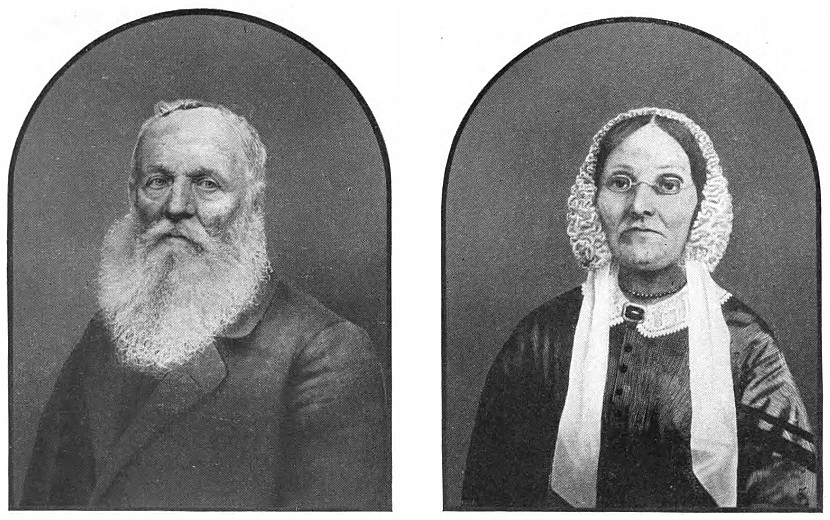
In 1830 Joseph Palmer created an odd controversy in Fitchburg, Massachusetts: He wore a beard when beards were out of fashion. For this social sin he was shunned, attacked, and ultimately jailed. In this week’s episode of the Futility Closet podcast we’ll tell the story of a bizarre battle against irrational prejudice.
We’ll also see whether a computer can understand knitting and puzzle over an unrewarded long jump.
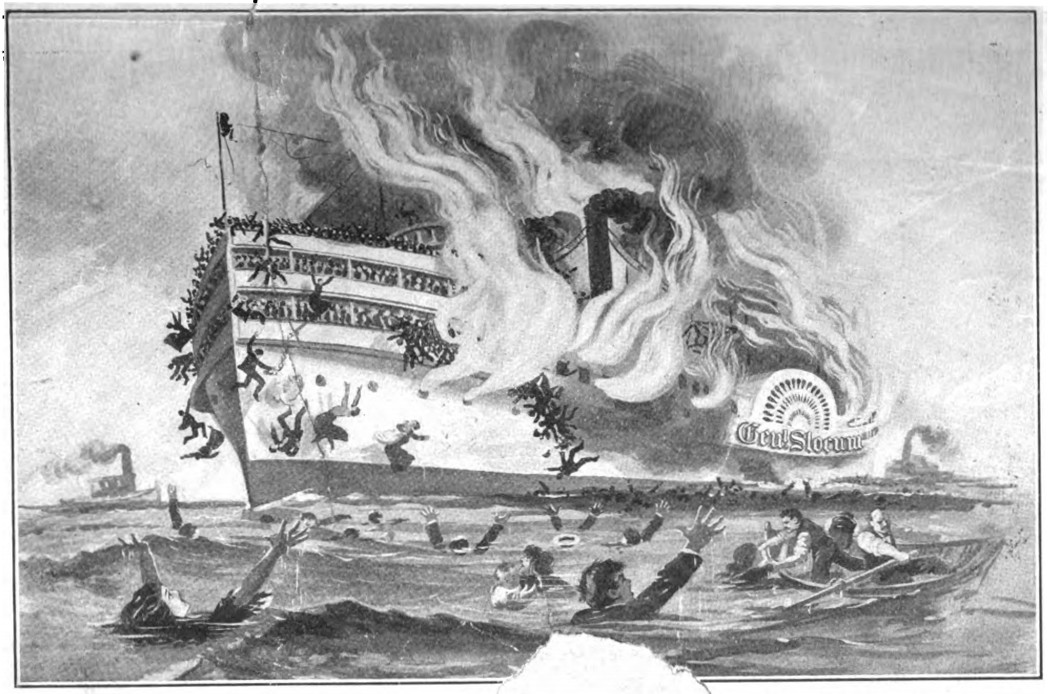
In 1904 a Manhattan church outing descended into horror when a passenger steamboat caught fire on the East River. More than a thousand people struggled to survive as the captain raced to reach land. In this week’s episode of the Futility Closet podcast we’ll describe the burning of the General Slocum, the worst maritime disaster in the history of New York City.
We’ll also chase some marathon cheaters and puzzle over a confusing speeding ticket.

… is an 11-letter word that contains 11 curved lines and 11 straight lines.
THREE = 03
Advance each character in that expression four steps in the alphabet or the number line and you get:
XLVII = 47
(Discovered by Dave Morice and Daniel McGrath. From “Kickshaws,” Word Ways 32:4 [November 1999], 283-293.)
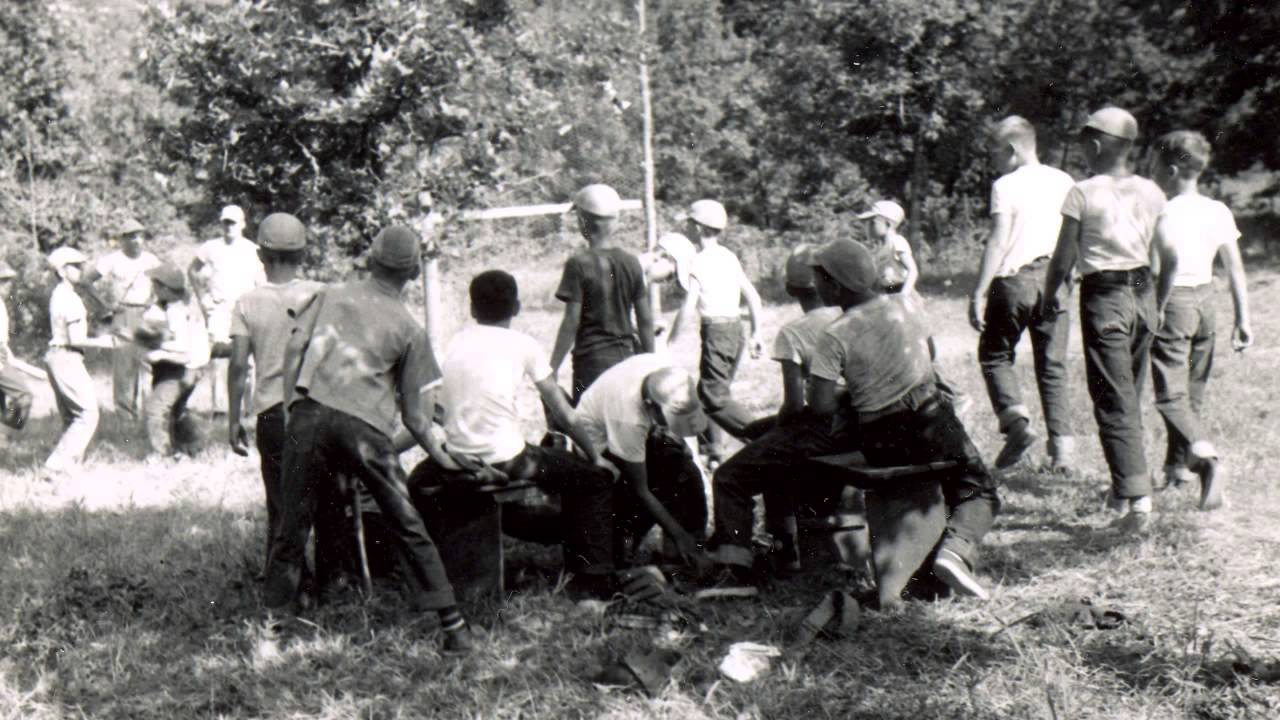
In 1954 a social psychologist started a war between two teams of fifth graders at an Oklahoma summer camp. He wanted to investigate the sources of human conflict and how people might overcome them. In this week’s episode of the Futility Closet podcast we’ll review the Robbers Cave Experiment and examine its evolving reputation.
We’ll also dredge up a Dalek and puzzle over a hazardous job.

In January 1942, a series of letters to the Daily Telegraph complained that the newspaper’s crossword was too easy — anyone might solve it in a matter of minutes, they said. Accordingly the chairman of a London club offered to donate £100 to charity if anyone could solve a given crossword in 12 minutes. Editor Arthur Watson arranged a competition in the paper’s Fleet Street newsroom, and five people won the competition (though the fastest was later disqualified for misspelling a word). Several were later hired to work at Bletchley Park breaking German military codes.
The Telegraph published the “time test” puzzle later that month, and presented it again in 2014, inviting readers to try to solve it in 12 minutes. “Could you have been a codebreaker at Bletchley Park?”
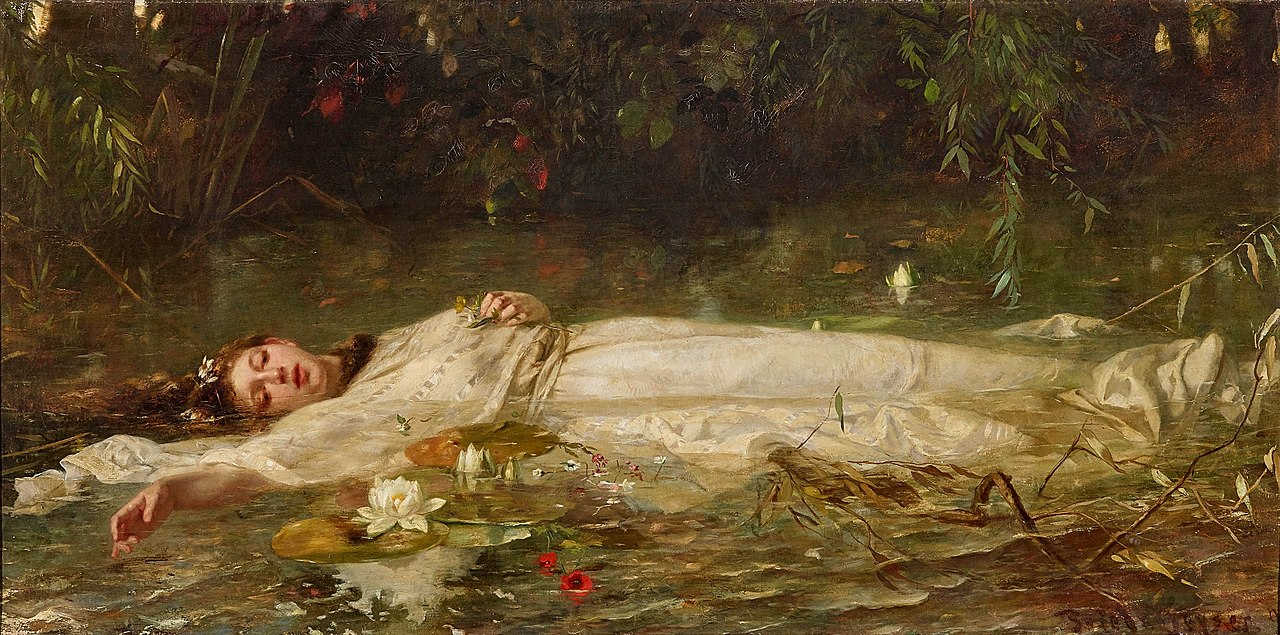
In Paul Griffiths’ 2008 novel let me tell you, Ophelia tells her story using only the 481-word vocabulary given to her in Hamlet:
So: now I come to speak. At last. I will tell you all I know. I was deceived to think I could not do this. I have the powers; I take them here. I have the right. I have the means. My words may be poor, but they will have to do.
What words do I have? Where do they come from? How is it that I speak?
There will be a time for me to think of these things, but right now I have to tell you all that I may of me — of me from when I lay on my father’s knees and held up my hand, touching his face, which he had bended down over me. That look in his eyes. …
“Where other characters from the play speak, they are similarly confined to the words Shakespeare gave them. Gertrude, for example, can use only Ophelian words present also in her own language. The one exception is the prefatory statement, whose author has full access to his play vocabulary.” A longer excerpt is here.
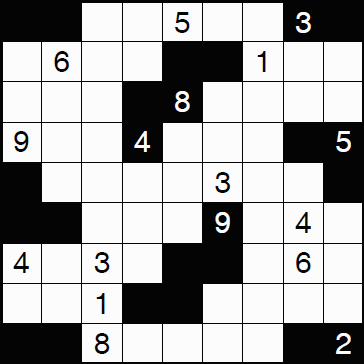
Canadian puzzle designer Jeff Widderich invented this game in 2007. The goal is to place a digit 1-9 in each white cell so that each crossword-style “word” contains a straight, that is, a set of consecutive numbers in some order. For example, the top row of five digits might contain 62534, but not 91548.
One other constraint: Each full row or column must contain no repeated digits. That means, for example, that each of the two long vertical “words” will contain all nine digits. The digits in black cells count toward this constraint — the 9 in the black cell near the center means that no 9 appears elsewhere in its row or column. Can you complete the rest of the diagram?
Students are sometimes taught never to use the same word twice in a sentence. This can lead to trouble: If a writer uses a synonym merely to avoid repeating a word, the reader can be left wondering whether there’s some significance in the change. H.W. Fowler called this affliction elegant variation and added, “There are few literary faults so widely prevalent.” He gives some examples:
The Bohemian Diet will be the second Parliament to elect women deputies, for Sweden already has several lady deputies.
Mr. John Redmond has just now a path to tread even more thorny than that which Mr. Asquith has to walk.
“What has Bohemia done that its females should be mere women?” Fowler asks. “And can Mr. Asquith really have taught himself to walk without treading?”
Charles W. Morton called this the “elongated yellow fruit” school of writing, after a famous second reference to a banana in the Boston Evening Transcript. (Sub-editors at the Guardian began using the term “povs” after one writer referred to carrots as “popular orange vegetables.”) Morton cited some further examples:
billiard balls = “the numbered spheroids”
Bluebeard = “the azure-whiskered wifeslayer”
Easter egg hunt = “hen-fruit safari”
milk = “lacteal fluid”
oysters = “succulent bivalves”
peanut = “the succulent goober”
songbird = “avian songster”
truck = “rubber-tired mastodon of the highway”
In A Slight Sense of Outrage, Morton wrote that the sin “lies somewhere between the cliché and the ‘fine writing’ so dreaded by teachers of English Composition. … It does bespeak an author who wishes to seem knowledgeable, and versatile. … It can also bespeak an author who is merely pompous.”